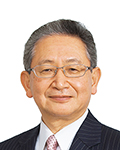Messages from Keidanren Executives and Contributed articles to Keidanren Journals September, 2023 Humankind's Role in Innovation

The world's problems are becoming more severe and complex. Environmental changes, geopolitical conflicts, overpopulation, economic stagnation, control of science and technology, and social instability are all difficult challenges on their own, but each one also has an impact on the others. In order to solve these problems, we must avoid one-sided actions that force us to choose between the environment or growth, and act as a "sound material-cycle society", meaning that we pursue measures that benefit both areas.
In order to achieve this, we need to adopt an approach that encompasses goals and areas that were traditionally considered unrelated or difficult to reconcile. We can create innovation in the fields of politics, economics, and science by brining opposing ideas together and finding new relationships between them. There has never been a time when we have needed innovation more urgently than we do today.
That brings us to the question — what is humankind's role in innovation? The progress of AI in recent years has been remarkable. It surpasses the level of knowledge attainable by a single person, and is beginning to display problem-solving skills beyond those of humankind. There is no doubt that AI will play an important role in future innovation. However, it cannot truly envision the future. The AI of today is limited to performing calculations and making inferences based on existing rules and data. Envisioning the future and making the impossible possible can only be accomplished by human intuition and ingenuity, like that of Newton or Einstein.
Moreover, only humans can judge the "value" in "value creation", which is the most crucial element of innovation. Finding the best path for humanity is fraught with disagreements and conflicts of value, which is why we need vision and action that transcends individual interests. Dr. Abraham Maslow, famous for his five-level "hierarchy of needs", actually proposed a sixth level in his later years, which he described as "self-transcendence". This level involves going beyond one's own desires to pursue the welfare of others and of society. Individuals with this spirit of self-transcendence will surely be the ones who pave the way for humanity's future.
It is very encouraging to see young people taking an interest in social issues and getting involved in activities to address them. Through efforts such as the realization of Biotechnological Transformation (BX), I too would like to do what little I can and contribute to building a foundation for the next generation to thrive.

